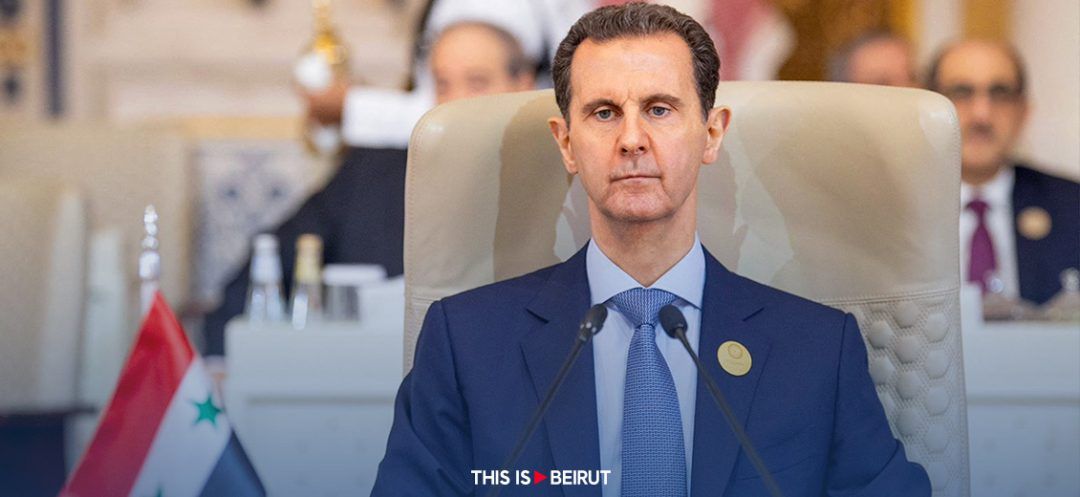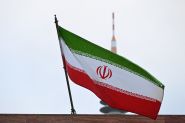- Home
- Middle East
- Bashar Al-Assad Says Syria Has Held ‘Meetings’ With US

©(SAUDI PRESS AGENCY / AFP)
Syrian President Bashar al-Assad said in an interview published Sunday by official news agency that Syria had held meetings "from time to time" with Washington.
US-sanctioned President Bashar al-Assad said in an interview published Sunday Syria has held meetings "from time to time" with Washington, as it seeks openings after over a decade of isolation.
The United States was among the first to cut ties with Assad over the repression of anti-government protests that sparked war in 2011, and many Western and Arab states also severed relations.
However last year Syria returned to the Arab fold, seeking better ties with wealthy US-allied Gulf states, in the hope they can help fund reconstruction -- although Western sanctions are likely to deter investment.
"America is currently illegally occupying part of our lands... but we meet with them from time to time, although these meetings do not lead to anything," Assad said in an interview with a Russian-backed official from Georgia's breakaway region of Abkhazia, published by Syria's official Sana news agency.
Assad did not give further details about who was involved in the meetings, or what was discussed.
"There is always hope: even when we know there will be no results we must try," he said when asked about the possibility of mending ties with the West.
After war broke out, the United States imposed a slew of sanctions on Syria -- which had already been a pariah state in the West under Assad's father Hafez.
In 2020, a US law known as the Caesar Act came into force that punishes any companies that work with Assad.
The Caesar Act, accompanied by a slew of US sanctions on Syrians close to Assad, aimed to force accountability for human rights abuses and to encourage a political solution.
Washington is also at odds with Damascus over US backing for northeast Syria's semi-autonomous Kurdish authorities, which have spearheaded the fight against the Islamic State group with support from a US-led international coalition.
Damascus accuses Kurdish authorities, which control most of the country's major oilfields, of separatism. It accuses them of being traitors because of their close US ties.
In 2022, US President Joe Biden had accused Syria of holding American journalist Austin Tice, abducted more than a decade ago in Damascus, and called on Syria's government to help secure his release.
The Syrian foreign ministry denied holding Americans, including Tice.
Tice was a freelance photojournalist working for Agence France-Presse, McClatchy News, The Washington Post, CBS and other news organisations when he was detained at a checkpoint near Damascus on August 14, 2012.
Avec AFP
US-sanctioned President Bashar al-Assad said in an interview published Sunday Syria has held meetings "from time to time" with Washington, as it seeks openings after over a decade of isolation.
The United States was among the first to cut ties with Assad over the repression of anti-government protests that sparked war in 2011, and many Western and Arab states also severed relations.
However last year Syria returned to the Arab fold, seeking better ties with wealthy US-allied Gulf states, in the hope they can help fund reconstruction -- although Western sanctions are likely to deter investment.
"America is currently illegally occupying part of our lands... but we meet with them from time to time, although these meetings do not lead to anything," Assad said in an interview with a Russian-backed official from Georgia's breakaway region of Abkhazia, published by Syria's official Sana news agency.
Assad did not give further details about who was involved in the meetings, or what was discussed.
"There is always hope: even when we know there will be no results we must try," he said when asked about the possibility of mending ties with the West.
After war broke out, the United States imposed a slew of sanctions on Syria -- which had already been a pariah state in the West under Assad's father Hafez.
In 2020, a US law known as the Caesar Act came into force that punishes any companies that work with Assad.
The Caesar Act, accompanied by a slew of US sanctions on Syrians close to Assad, aimed to force accountability for human rights abuses and to encourage a political solution.
Washington is also at odds with Damascus over US backing for northeast Syria's semi-autonomous Kurdish authorities, which have spearheaded the fight against the Islamic State group with support from a US-led international coalition.
Damascus accuses Kurdish authorities, which control most of the country's major oilfields, of separatism. It accuses them of being traitors because of their close US ties.
In 2022, US President Joe Biden had accused Syria of holding American journalist Austin Tice, abducted more than a decade ago in Damascus, and called on Syria's government to help secure his release.
The Syrian foreign ministry denied holding Americans, including Tice.
Tice was a freelance photojournalist working for Agence France-Presse, McClatchy News, The Washington Post, CBS and other news organisations when he was detained at a checkpoint near Damascus on August 14, 2012.
Avec AFP
Read more



Comments